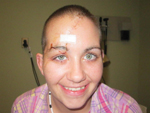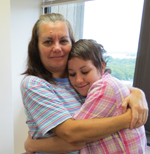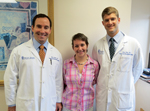|
by Dawn
Brazell
Public Relations
Ashley
Whittle pats the back of her
modish hairstyle and smiles
shyly.
She's trying
to adjust to her new looks
having lost the waist-long hair
she used to have. "I'm like a
kitten who's all curious," she
said, her manicured fingers
playing in her hair. The
miracle, other than that she has
started to feel beautiful again,
is that her hair's growing and
with it a new sense of hope as
she recovers from an industrial
accident that happened Jan. 30
that tore off a section of her
scalp and forehead.
 Ashley Whittle at
four months after a surgery
where MUSC doctors reattached
her scalp following an accident
at a plant where she worked. Ashley Whittle at
four months after a surgery
where MUSC doctors reattached
her scalp following an accident
at a plant where she worked.
She has
returned for a check-up to MUSC
to visit with plastic and
reconstructive surgeon Kevin
Delaney, M.D., one that brings
tears to the eyes of Whittle,
24, and her mother, Tammy, as
they offer their thanks to
Delaney and the team of doctors
and nurses who have helped
Whittle recover. A whiz in
handling complicated
microsurgery cases, especially
replantations of amputated
parts, Delaney was the one who
got a call that Monday in
January when doctors at a
Columbia hospital were on the
phone trying to find a hospital
who could handle her case.
Delaney was
glad to take her.
"I like
solving problems. When people
come in with complex injuries
that require the highest level
of reconstruction that typically
involves microsurgery, that's
very interesting to me and
exciting. I like to see good
outcomes in the patients I
treat."
Delaney
quickly assembled two surgery
teams and had Whittle airlifted,
for the second time that day,
for treatment at MUSC.
Meanwhile, Tammy had to travel
by car, praying all the way that
her daughter would survive,
trying to block out the memories
of the last few hours. When
Tammy got the call that her
daughter had been injured at the
plant where she worked and was
being flown to a hospital in
Columbia, she panicked. "Time
stopped for me then. I knew it
couldn't be good."
She
braced herself for what she
would see, but still wasn't
prepared when she arrived at the
hospital in Columbia for the
extent of the injuries. "She was
losing blood consistently. It
was a complete detachment. It
was a very rare, rare case. It's
not what any mother wants to see
happen to her child. "
 Ashley Whittle's
mother, Tammy, gives her
daughter a big hug at a recent
visit to MUSC. To see a video,
visit http://bit.ly/MicroSurgery. Ashley Whittle's
mother, Tammy, gives her
daughter a big hug at a recent
visit to MUSC. To see a video,
visit http://bit.ly/MicroSurgery.
The Surgery
A
successful scalp replantation
happens only a few times yearly
nationwide, said Delaney. He was
glad to get the call, given that
he and his group do many
extensive, complex surgeries
involving microsurgery each
year.
"It's
difficult to treat because we
have to take the tiny
microscopic blood vessels that
are still attached to the
amputated scalp and, using a
high-powered microscope, we have
to attach those tiny arteries
and veins to the surrounding
arteries and veins still on her
head to get adequate blood
flow."
The
vessels are one to three
millimeters in size so it is
delicate, painstaking work.
Ashley's scalp amputation
included a portion of her right
eyebrow, which meant the piece
of tissue that had to be sewn on
was larger than usual and the
vessels in the brow area were
smaller, which made it even
trickier.
 Whittle just
after her Jan. 30 surgery. Time was
critical to the success of
getting her scalp reattached by
the two teams of microsurgeons
required for the procedure. Whittle just
after her Jan. 30 surgery. Time was
critical to the success of
getting her scalp reattached by
the two teams of microsurgeons
required for the procedure.
"It was
one of the most complex cases
that we've had."
Ashley's
surgery took two plastic surgery
teams, and lasted about 10
hours. One group prepped the
patient and the other cleaned
the scalp that fortunately had
been preserved by the first
responders. Both groups
identified the vessels to be
used in surgery.
"I was on
both teams. I was orchestrating
the entire process until we did
the microsurgery to hook the
scalp up, and then I was
involved with that whole
process."
Doctors
properly positioned the scalp
back onto her head, temporarily
securing it in place with
sutures. Arteries and veins on
the amputated scalp and that
were identified and marked were
unclamped and irrigated with an
anti-clotting solution. Using
the microscope, two
microsurgeons worked together to
hook up the ends of two to three
veins between the amputated
scalp and the patient. Once the
veins were hooked up, the
plastic and reconstructive
microsurgeons began work on the
arteries. Once completed, the
blood vessel micro-clamps were
removed and the blood flow was
restored to the amputated scalp.
Delaney
said the scalp immediately
regained its color.
The blood
vessel that were joined were
then evaluated using a doppler
machine that helps monitor the
continued blood flow where the
vessels had been joined.
Monitoring at this stage is
critical. Ashley went to the
surgical intensive care unit
where her scalp was monitored on
an hourly basis by evaluating
its color, temperature and
turgor, as well as regular
doppler probes to check the
blood flow across the
reconnected vessels.
Delaney
said sometimes doctors have to
use medicinal leeches to better
control the blood draining
properly, and this was the case
for Ashley. Her mother, Tammy,
said this part of the treatment
gave her pause. "I said, 'Wait a
minute.' I grew up in the
country and I know what those
leeches can do. You're going to
have to explain this to me."
 Ashley Whittle
enjoys a visit with Drs. Kevin
Delaney, left, and Jason Ulm, a
plastic and reconstructive
surgical fellow. Ashley Whittle
enjoys a visit with Drs. Kevin
Delaney, left, and Jason Ulm, a
plastic and reconstructive
surgical fellow.
Ashley,
who has intermittent memories of
the whole time, was awake for
this part of treatment and said
it took some adjustment on her
part. They explained how the
leeches 'drink' the excess blood
and produce hirudin, a natural
anti-coagulant in their saliva
that improves blood flow in the
scalp. Ashley said it was tough,
but she understood how it would
help.
Her
mother said she was so proud of
her, both how she fought to
survive her injury and how she
pushed through recovery. "I was
just completely amazed at what
they had to do. I can't fathom
the idea of having the nature of
that kind of an injury happening
to you. Thank God, she has some
strength to deal with things.
She kicked into survival mode."
Taking Root
Delaney
said he's thrilled by Ashley's
progress.
"When you
have a patient who has a good
attitude and who is willing to
do what you ask during the
recovery, then that helps to
bring a good outcome."
He also
praises the teamwork of doctors
and nurses involved with her
case. Advances in
instrumentation has opened up
all kinds of possibilities in
microsurgery, giving plastic and
reconstructive surgeons the
ability to do incredible things
for patients who have severe
injuries. They have handled
reattachments of all types of
body parts, including fingers,
hands and tongues. They also are
able to do intricate,
reconstruction surgery for
cancer patients.
In
Ashley's case, if doctors had
tried to just cover her wound,
she would have been left with a
very, severe defect of her
scalp. "She would have never had
her own hair. She would have
required multiple, additional
operations just to close the
wound and get the bone of her
scalp covered and closed. She
would have never been able to
grow her own hair in that area."
Tammy,
who's from Great Falls, said
she's amazed every time she
thinks about it. They treasure
the relationships they formed,
which is one reason they love
coming back to Charleston for
check ups to visit the staff
again. "The nurses were amazed
at her progress of recovery, "
said Tammy. "She handled
everything really well. It
helped that they were young
people, and they really related
to her very well, down to
cutting up with her about her
fingernail polish. It turned a
really bad experience into the
best it could have ever been.
None of this could have happened
without the team of doctors she
had."
Ashley
said she doesn't remember much
about the accident except that
she was able to pull herself
away from the napkin-folding
machine that trapped her hair.
"The next thing I knew I was in
the back of an ambulance." She
does remember being terrified of
the flight from Columbia to
Charleston because she's scared
of heights, and waking up after
surgery.
She spent
14 days at MUSC, and her
recovery has gone smoothly. She
finally has started sleeping
better. The accident marks a
turning point in her life. She
has decided she wants get her
GED and take a new path in life,
she said. "It's amazing how
quick my hair is growing and
that I actually have a head-full
of hair now. I had a great team
and if it weren't for them, I
wouldn't be here now and I
wouldn't look as beautiful as I
do right now."
Tammy
beams at her daughter's
statement. Part of the new
confidence her daughter shows
now comes from the support she's
gotten from Delaney, who took
control of her daughter's case
and watched over every aspect.
"I love the look of total
amazement when he sees her. He
didn't expect her hair to be
anything like it is. He boosts
her confidence in herself and
lets her see how life goes on.
She's able to look at herself
and say, 'I am beautiful.'"
|



 Ashley Whittle at
four months after a surgery
where MUSC doctors reattached
her scalp following an accident
at a plant where she worked.
Ashley Whittle at
four months after a surgery
where MUSC doctors reattached
her scalp following an accident
at a plant where she worked. Ashley Whittle's
mother, Tammy, gives her
daughter a big hug at a recent
visit to MUSC. To see a video,
visit
Ashley Whittle's
mother, Tammy, gives her
daughter a big hug at a recent
visit to MUSC. To see a video,
visit  Whittle just
after her Jan. 30 surgery.
Whittle just
after her Jan. 30 surgery.  Ashley Whittle
enjoys a visit with Drs. Kevin
Delaney, left, and Jason Ulm, a
plastic and reconstructive
surgical fellow.
Ashley Whittle
enjoys a visit with Drs. Kevin
Delaney, left, and Jason Ulm, a
plastic and reconstructive
surgical fellow.